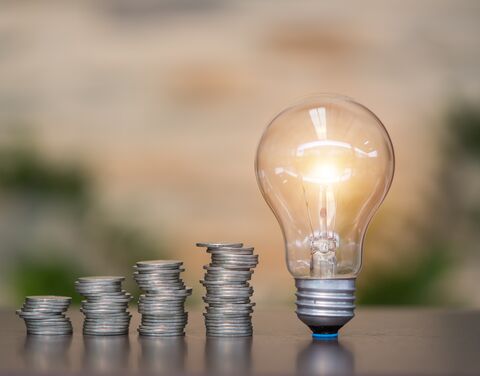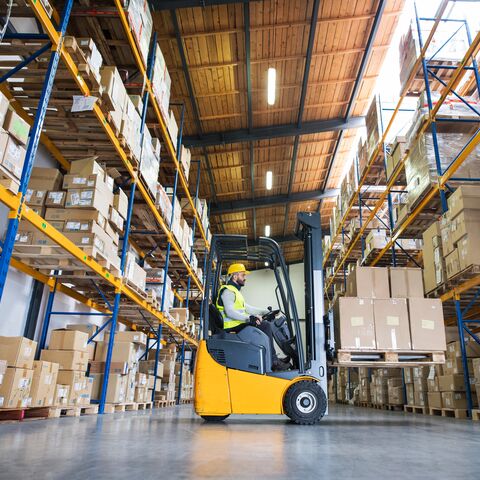
Save electricity at your company – it’s easy
Regardless of whether you have a factory or an office, your company uses electricity. With a couple of measures, you can eliminate unnecessary electricity hogs and lower your energy costs at the same time. Five simple tips for companies to save electricity.
Rising energy prices have been causing financial headaches for some time now. And no wonder. Switzerland consumed an incredible 57 terawatt hours in 2022. About 30 percent of this was used by industry and 25 percent by the services sector. With their computers, screens, servers and air conditioners, offices are catching up to manufacturing plants with their energy consumption, so they too need to cut usage.
Energy consumption will have to become more efficient in the future, not least to protect the planet. And since the energy crunch of winter 2022/23, the entire country has been increasingly concerned with saving electricity. The good news is that saving energy is doable! In many cases, cutting energy usage is easier than you think.
Use these 5 tips to save energy
Tip 1: Heating – lower the temperature when the building is not in use
At night, on weekends or during company vacations, lower the flow temperature of the building’s heating or the heating system in certain rooms. This will lessen the difference in temperature between the rooms in the building and the outside air. This is particularly important in old buildings or poorly insulated buildings because lowering the temperature at night can result in energy savings of 5 to 10 percent.
The best time to calculate your potential reduction is on a night when it is 0°C outside. Close all the windows in the evening and turn the heating completely off. Measure the room temperature the next morning. If the temperature dropped by more than 3°C overnight, then it’s worth lowering the heating at night. But please note that the temperature should never fall below 16°C because you run the risk of damp spots and mold.
Tip 2: Airing out – adapt to usage of the room during business hours
Ventilation systems generally run when the shop floor or the office is in use. Program your ventilation system to shut off between 8 pm and 6 am. This will lower your energy consumption by 40 percent. You should note that the the ventilation system does not necessarily need to run when people are present. Instead, schedule a brief pre-run before people come in.
Here’s how to get the most efficient use out of your ventilation system: In addition to optimizing operating times, adjust the amount of airflow to prevailing requirements. Large rooms such as restaurants, shopping centers or multi-purpose halls see large fluctuations in the number of visitors, so the airflow should be adapted to these fluctuations. Shut the ventilation completely off on holidays and air out the building for 30 minutes every day to maintain air quality (CO₂ content, temperature). If the room is half full, select Level I (50% airflow) and if it is more than half full, then select the highest level (Level II or 100 percent airflow). If you cut the airflow in half, your energy usage for ventilation will drop by up to 80 percent.
Saving energy: Discover your potential
Depending on the industry, every company has the potential to save between 20 and 40 percent on energy and electricity. Tools such as the ProEDA compressed air calculator help you to improve the energy efficiency of your company and lower your energy costs. There are also regional and local energy consultants available.
Tip 3: Lighting – replace old bulbs with new ones
Older fluorescent bulbs require a lot of maintenance and eat up energy. Starting in 2023, certain types of lighting have been banned – which means they can no longer be sold. So it’s really worth replacing older models with energy-efficient LED lights. Retrofit LEDs are specifically made to fit into existing standard sockets and fixtures. This means you can save between 40 and 60 percent on energy. Long-lasting LED tubes are recommended for rooms that are used for long periods – such as warehouses and shop floors. Carry out a test installation in order to gauge your needs regarding the lighting level (Lux), light distribution, light color and glare. You should also test the installation of a presence or motion detector.
Tip 4: Cold – close coolers and freezers
Regularly check whether your coolers and freezers are properly closed. Open cooling units such as display cases, shelving or open / bunker freezers should be closed at night and on the weekend. Covers, rolling covers or glass doors work well for this purpose. Check existing covers and replace any seals on glass doors when necessary. Always cover freezer units and replace glass doors on coolers – the savings will be worth it. By closing the doors on coolers, you can save up to 30 percent in energy usage. Careful and regular maintenance is also important to energy efficiency.
Tip 5: Compressed air – eliminate leaks in compressed air units
Compressed air systems must be in good working order because depending on the situation they might be in use for a couple of hours or round the clock. Since compressed air is expensive, it’s a good idea to regularly check the compressed air system for leaks. A poorly maintained compressed air supply system could lose an average of up to 40 percent in air. You can detect leaks by listening for them when all users have been disconnected. Or you can use foam leak detector spray to easily and precisely locate the leak. A leak detector device is useful for more complex systems. Eliminate leaks right away, e.g. by tightening fastenings, replacing O rings or switching out plug nipples, hoses or hose clips. If you can’t fix a leak right away, then label it and order the materials you need or hire a specialist if necessary.
Power outage scenario: How companies can prepare
In the future, Switzerland could see power shortages that lead to blackouts. The federal government is urging businesses to prepare for such a scenario. The Federal Office for National Economic Supply has prepared detailed information for this purpose. What precautions are necessary and useful varies depending on the industry and the size of the company.
Comprehensive measures
Business Continuity Management (BCM)
What activities form the core of your business? What can you do to ensure continuity even if the power goes out? Analyze your business processes: The aim is to keep your company running.
Structural measures
Keep the risk of blackouts in mind for new buildings and renovations. Invest in good insulation, cooling units with airlocks, sufficient sources for daylight or in manual airing options, for example.
Emergency electrical supply
Consider buying an emergency power generator so you can maintain all processes that are vital to the safety of humans and animals. And any machinery that could be damaged by interruptions in electricity supply or would be very costly to repair need special protection.
Uninterruptible Power Supply (UPS)
A UPS unit serves as a filter between electrical supply systems and the end device. It protects electronic equipment from fluctuations such as overvoltage or undervoltage and it’s integrated energy storage can provide energy during a power outage. Hospitals, data centers and signal towers, etc. all use them.
Additional precautions
There are also countless small things we take for granted that can turn into real headaches if the electricity cuts out. To avoid this, you could:
- Install emergency lighting that runs on batteries
- Equip surveillance systems with batteries or an emergency power supply
- Ensure that electric doors have a mechanical opening / closing option
- Set up manual alternatives (e.g. hand pallet trucks)
- Keep a hard copy of vital documents (e.g. contact data)
- Review various means and channels of communication
- Regularly save your data and store the copies in a different location from the server
- Define emergency procedures and train employees to use them
- Make sure you have sufficient supplies
Basically: The more efficient your business operates and the more you cut your electricity usage, the better. By prioritizing energy savings, not only do you optimize your energy costs, you will also gradually become a little less dependent on electricity.







